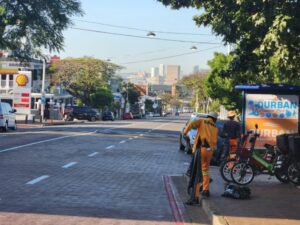The build-up to the final examinations has been particularly challenging for Khayelitsha matriculants this year. Their school attendance was disrupted by the scholar-transport stayaway earlier in the year, and the violent taxi protest in August as reported by Groundup. The taxi protest led to the closure of 30 schools based mainly in the townships of the province.
Thandisizwe Mabhodli, a matriculant at Zola Business School, says that the disruptions had mostly affected them during the trial examinations in September. “We didn’t perform well for the trial examinations, but our school arranged extra classes for us from Monday to Sunday back-to-back,” he says. “This has prepared us well for the final examinations and made up for the time we lost during the taxi strike.”
Western Cape MEC for Education David Maynier says that these disruptions took a huge toll on learners; schools and teachers have had to work extra hard to support and help learners catch up. “Our department prepares contingency plans each year; disruptions in the form of strikes and protests have a detrimental effect on our candidates. Matric is a stressful enough time without our learners having to worry about getting to their exams safely. We appeal to everyone in the Western Cape to treat our matriculants as the VIPs of our province for the next few weeks. We do not want to see their futures compromised by the selfish actions of the few,” he says.
The Western Cape Education Department hopes to achieve nothing less than the previous year’s pass rate of 81.4% and has implemented ways to support all schools that achieved below 60% pass rate in the province. They have provided schools with the matric support booklet which consists of past examination papers, links for video lessons, study guides etc.
“All underperforming schools are required to implement their school improvement plan, which is monitored by the district office which ensures that they have the support they need to improve, depending on the unique needs of each school. Our #BackOnTrack programme is also supporting schools needing assistance to improve their results, across multiple grades,” says Maynier.
Lilitha Qokolisa, a grade 12 learner from one of the worse performing schools last year, Masiyile High School, credits her school for giving support to learners. “The school and our teachers have really done so much to prepare and show us support, we had to go to school even on weekends,” she says. She was on her way to school during this interview, three days before the official commencement of the final examinations, to attend lessons on the parts of the syllabus they had not covered.
Lulamela Mahomba from Masibambisane High School says that the taxi strike impacted her studies. Fortunately, her school arranged private study sessions for the matriculants. “They assisted us with our major subjects, which made things a little bit easier for us. We also formed study groups to assist each other,” she says.
The education MEC also commends the teachers of the class of 2023: “Our grade 12 teachers have been doing a phenomenal job preparing their learners for the exams, despite challenges like the minibus taxi strike and loadshedding. We thank them for their hard work, and wish them all the best as they continue to ensure that learners are well-prepared for post-school education and employment opportunities.”





